|
|
|
Sort Order |
|
|
|
Items / Page
|
|
|
|
|
|
|
| Srl | Item |
| 1 |
ID:
172453
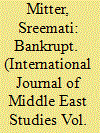

|
|
|
|
|
| Summary/Abstract |
In the late 1930s, the first independent Arab banks in Palestine, the Arab Bank and the Arab Agricultural Bank, sued customers who had defaulted on loans in an attempt to maintain solvency. Their indebted customers, unable to pay, fought back to prevent their lands from being foreclosed and sold to Zionist buyers. Each party claimed that its position was consistent with, indeed essential to, the anti-Zionist nationalist cause. The story of these pioneering Arab banks and their legal battles with their customers in the wake of the 1936-1939 revolt provides insight into Arab financial life in Mandate Palestine. It reveals the banks’ struggles to survive; complicates notions of Arab-Palestinian landlessness and indebtedness; and argues that political and economic exigencies, not reductive notions of collaboration or patriotism, produced the banks’ antagonistic relationship with their customers, whereby the survival of one came at the expense of the other.
|
|
|
|
|
|
|
|
|
|
|
|
|
|
|
|
| 2 |
ID:
155051
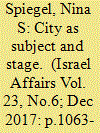

|
|
|
|
|
| Summary/Abstract |
This article investigates the impact of dance on the development of Tel Aviv during the British Mandate of Palestine. It shows how theatrical, salon, and folk dance forms shaped the culture as well as the physical space of the burgeoning city, and how national ideas were encoded into this nexus. The city served as both stage and subject of dancing and choreographic activity.
|
|
|
|
|
|
|
|
|
|
|
|
|
|
|
|
| 3 |
ID:
132970
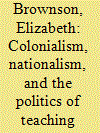

|
|
|
|
|
| Publication |
2014.
|
| Summary/Abstract |
For Palestinian nationalists in Mandate Palestine, British education policy was a source of constant frustration. The shortage of schools, the lack of local control over the curriculum, and the marginalization and de-politicization of Palestinian history constituted major grievances. Proceedings from the Peel Commission reveal much about the rationale behind this policy, particularly the bias toward "rural" education and the attempts to control teachers. Drawing on and complementing the work of A.L. Tibawi, this article seeks to shed light on the nationalists' protests by examining both the responses of officials brought before the Commission, as well as the government's history curriculum during the Mandate. In doing so, the research shows that education policy was constructed to maintain the underdevelopment of Palestine and to hinder state-building efforts that could compete with those of the Zionists.
|
|
|
|
|
|
|
|
|
|
|
|
|
|
|
|
| 4 |
ID:
179889
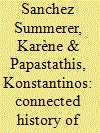

|
|
|
|
|
| Summary/Abstract |
The special issue critically explores, at a micro and macro level, the structural role and religious, cultural and political interactions of the Greek-Orthodox, Melkite and Syriac communities in late Ottoman and Mandate Syria and Palestine. It seeks to identify archival gaps, and to link the study of the micro-scale level of everyday cultural and religious life to the macro-narratives of global change affecting Christian communities, in a connected perspective, via dynamics of cultural and religious personal and institutional interactions. The Christian communities, both as institutions and lay bodies, are of special interest for the field of Levantine studies, since they were placed at the heart of the local power game, expressing the quest for social emancipation, while also keeping close links with diplomatic actors, colonial institutions, and foreign religious agents. The research presented lies on the idea that the communities in focus were inextricably linked, being actors operating within the same multi-ethnic periphery, having the same legal status, and being in contact to foreign agents, while at the same time politically dependent to the centralized ottoman and mandatory authorities.
|
|
|
|
|
|
|
|
|
|
|
|
|
|
|
|
| 5 |
ID:
165739
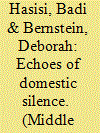

|
|
|
|
|
| Summary/Abstract |
This article deals with the manner in which family and community in Mandate Palestine attempted to keep the criminal justice system from intervening in cases defined as ‘Family Honour Killing’. Drawing on criminal court cases, we argue that the familial, domestic and communal features of this crime and its social, predominantly rural, context were critical for the attempts to keep it within the community and to prevent state intervention by obstructing, concealing and denying evidence. We focus on the mechanisms used by members of the family and community for that purpose. Our case study is in line with previous findings indicating the under-reporting of domestic violence, especially when witnesses were closely related to both the victim and the perpetrator. This domestic and communal alignment was most likely reinforced under colonial rule, though it was not necessarily caused predominantly in opposition to it.
|
|
|
|
|
|
|
|
|
|
|
|
|
|
|
|
| 6 |
ID:
183984
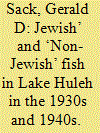

|
|
|
|
|
| Summary/Abstract |
Before it was drained in the 1950s the Huleh Lake and swamps were an important fishing ground, supplying fish locally and as far south as Haifa. In the late 1940s a controversy arose between Jewish fishermen from the Yesod Hama’ala moshava and Kibbutz Hulata and a Christian Arab notable and his Jewish partner, both from the town of Safed, over the catching and marketing of fish caught in Lake Huleh. The Jewish villages pressured Tnuva. The Jewish produce marketing cooperative to market only ’Jewish’ fish, and thus to exclude the fish caught by the effendi and his partner. Today, after the draining of the Huleh swamps, the only fish caught and marketed from the area are those raised in kibbutz fishponds.
|
|
|
|
|
|
|
|
|
|
|
|
|
|
|
|
| 7 |
ID:
161102
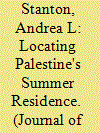

|
|
|
|
|
| Summary/Abstract |
The carving up of the Ottoman Levant into British and French Mandates after World War I introduced new realities for the inhabitants of the region. This article uses Lebanese tourism and the promotion of Lebanon as a tourist destination to Palestinians of all religious backgrounds as a case study to investigate the challenges and potentials of the new Mandate structures. Using Palestinian government archives and newspapers, it examines how Lebanon was marketed to Palestinian vacationers. It concludes by suggesting that tourism, with its mixture of private and government sector interests, serves as a key node for observing the messy process of relational identities when two sets of neighbors worked to reframe themselves in national terms.
|
|
|
|
|
|
|
|
|
|
|
|
|
|
|
|
| 8 |
ID:
180233
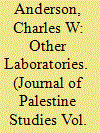

|
|
|
|
|
| Summary/Abstract |
This essay briefly examines a pattern of little-known local and general strikes staged by the Palestinian public during 1938, amid the Palestinian uprising known as the Great Revolt. While largely overshadowed by the armed struggle then underway, these nonviolent strikes illustrate the widespread character of Indigenous resistance to British colonial rule and of support for the rebellion. Palestine has often been described as a laboratory for repression; yet when we attend to Palestinian social history, we also see that it has been a laboratory of freedom struggle, popular resilience, and recurrent waves of activism and tactical experimentation.
|
|
|
|
|
|
|
|
|
|
|
|
|
|
|
|
| 9 |
ID:
189542
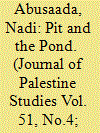

|
|
|
|
|
| Summary/Abstract |
The rationalization of urban water-supply systems and networks was a pressing concern in the development of modern cities globally in the late nineteenth and early twentieth centuries. The rise of the modern city did not manifest only in the complete overhaul of water and sewage infrastructures but also in the creation of new mechanisms of urban governance to manage them. Examining understudied municipal water projects in Jaffa and Nablus, two chief centers of light industry in the late Ottoman and Mandate eras, this paper provides an analysis of the historical relationship between urban governance and urban infrastructures in modern Palestine. It investigates the involvement of Palestinian urbanites in the debates over municipal water projects in their cities, demonstrating that these constituted more than merely utilitarian instruments and were foundational to the articulation of urban rights in modern Palestine.
|
|
|
|
|
|
|
|
|
|
|
|
|
|
|
|
| 10 |
ID:
168374
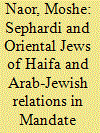

|
|
|
|
|
| Summary/Abstract |
This article examines the development of the relations between Jews and Arabs in Haifa during the British Mandate period from the perspective of the Sephardi and Oriental Jews (Mizrahim). It focuses on the two Sephardi neighborhoods in Haifa: Ard al-Yahud and Harat al-Yahud. The article examines the character of the shared Jewish-Arab space that existed in both these mixed neighborhoods, which were inhabited by both Jews and Arabs. The character of this spatial system was exposed during the course of a local political struggle to secure representation for the Sephardi and Oriental Jews and to improve their social condition, as well as during periods of security tension. The article also examines the attitude of the Sephardi leadership toward the ‘Arab question’, and discusses the manner in which everyday life in Ard al-Yahud and Harat al-Yahud manifested the existence of an Arab-Jewish identity during the Mandate period.
|
|
|
|
|
|
|
|
|
|
|
|
|
|
|
|
|
|
|
|
|